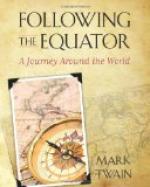Tuesday, May 12. Transvaal politics in a confused condition. First the sentencing of the Johannesburg Reformers startled England by its severity; on the top of this came Kruger’s exposure of the cipher correspondence, which showed that the invasion of the Transvaal, with the design of seizing that country and adding it to the British Empire, was planned by Cecil Rhodes and Beit—which made a revulsion in English feeling, and brought out a storm against Rhodes and the Chartered Company for degrading British honor. For a good while I couldn’t seem to get at a clear comprehension of it, it was so tangled. But at last by patient study I have managed it, I believe. As I understand it, the Uitlanders and other Dutchmen were dissatisfied because the English would not allow them to take any part in the government except to pay taxes. Next, as I understand it, Dr. Kruger and Dr. Jameson, not having been able to make the medical business pay, made a raid into Matabeleland with the intention of capturing the capital, Johannesburg, and holding the women and children to ransom until the Uitlanders and the other Boers should grant to them and the Chartered Company the political rights which had been withheld from them. They would have succeeded in this great scheme, as I understand it, but for the interference of Cecil Rhodes and Mr. Beit, and other Chiefs of the Matabele, who persuaded their countrymen to revolt and throw off their allegiance to Germany. This, in turn, as I understand it, provoked the King of Abyssinia to destroy the Italian army and fall back upon Johannesburg; this at the instigation of Rhodes, to bull the stock market.
CHAPTER LXVI.
Every one is a moon, and has a dark side which he
never shows to anybody.
—Pudd’nhead
Wilson’s New Calendar.
When I scribbled in my note-book a year ago the paragraph which ends the preceding chapter, it was meant to indicate, in an extravagant form, two things: the conflicting nature of the information conveyed by the citizen to the stranger concerning South African politics, and the resulting confusion created in the stranger’s mind thereby.
But it does not seem so very extravagant now. Nothing could in that disturbed and excited time make South African politics clear or quite rational to the citizen of the country because his personal interest and his political prejudices were in his way; and nothing could make those politics clear or rational to the stranger, the sources of his information being such as they were.




